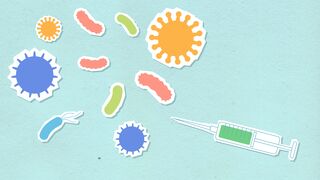Media
How Anti-Vax Propaganda Succeeded in Japan
Lessons from the rise of disinformation during Japan's HPV vaccine rollout.
Posted August 16, 2021 Reviewed by Devon Frye
Key points
- Data shows that states experiencing the most COVID outbreaks also have the lowest vaccination rates.
- A 2014 study found that pro-vaccine messages are not effective. In fact, sometimes these messages can reinforce misinformation.
- In Japan, HPV vaccinations plummeted from 74 percent to .07 percent because of anti-vax propaganda which circulated throughout the news media.
- Despite lack of evidence, the Japanese government stopped recommending the HPV vaccine, resulting in an estimated 3,000 deaths annually.

More than a year and a half since COVID-19 uprooted our lives, the idea that things will return back to normal still remains little more than a fantasy. Even with the widespread availability of effective vaccines, we're now seeing some of the highest infection and hospitalization rates since the onset of the pandemic. If you’re on the side of science, you know why this is happening: not enough people are getting vaccinated.
While the delta variant is resulting in an increase of COVID cases everywhere, the data shows that states experiencing the most outbreaks also have the lowest vaccination rates. Among them, Florida, Tennessee, Louisiana, Mississippi, and South Carolina all come below the U.S. average rate of 49.2 percent. During the last week of July, Florida and Texas were home to one-third of nationwide COVID cases. Meanwhile, the conservative governors of both states have added fuel to the virally spread fire by banning mask mandates which have, in turn, exacerbated spread, leading to the highest number of hospitalizations and deaths in the country.
What this behavior shows is that the pandemic has sharply shifted into a “pandemic of the unvaccinated,” according to Dr. Rochelle Walensky, director of the Centers for Disease Control and Prevention. As of Aug. 2, CDC has found fewer than one-hundredth of one percent of the vaccinated have been hospitalized or died due to COVID complications —the vast majority of serious cases are afflicting the unvaccinated.
The numbers don’t lie, but some of those who are vaccine-hesitant or resistant seem to think they do. One of the more popular but debunked social media-driven narratives is the myth that the vaccines were “rushed,” “experimental,” or “lack safety tests.” Before you write these people off as a small minority, a recent Kaiser Family Foundation study found an alarming 53 percent of the unvaccinated are more fearful of the vaccine than the disease itself.
Despite best efforts from global health experts promoting that vaccines are indeed safe, effective, and life-saving, many of the unvaccinated don’t appear to be budging. In particular, White, evangelical, and rural people are among the most vociferous and reluctant. By now, you’ve likely heard stories of patients struggling to breathe or lying on their deathbed, but still denying that COVID, masks, or vaccines—any of it—are real or necessary. But their resistance shouldn’t come as a surprise.
A rather clairvoyant 2014 study published in Pediatrics found that when researchers tested a variety of pro-vaccine messages (based on CDC guidance) to encourage parents to vaccinate their children, not a single one was effective.
The types of interventions included info showing there was a lack of causal evidence between the vaccine (i.e., measles-mumps-rubella) and autism, text info about the diseases that were prevented by the vaccine and how they could endanger children, pictures of children who had diseases that were prevented by the vaccine and stories of babies who nearly died from measles.
In fact, sometimes, the message made parents double-down on their anti-vax stance or reinforced their belief that vaccines caused autism. For the record, numerous studies have tried to find a causal link between vaccines and autism, but there is none.
Still, a 2019 Gallup poll saw a noticeable increase in anti-vaccine sentiment in the U.S. with just 84 percent of adults saying that getting children vaccinated was very important compared to 94 percent in 2015.
The report indicated that while around 90 percent of adults were aware of the benefits of childhood vaccination, more people had reported hearing of potential disadvantages, which researchers believe is why public support of vaccines has waned.
Lately, vaccine resistance manifests itself through large, maskless public protests, conspiracy-laden social media memes which claim vaccines turn you into a human magnet, and the more dangerous and reckless political grandstanding committed by some leaders (see above). While these stories often make for clickable headline fodder, these disinformation super spreaders only make up a small portion of the electorate.

Yet, it’s worth considering: What happens if the number of people who trust vaccines continues to decrease? Or, what if it remains the same? Can we still one day return to normal?
To answer these questions, we might look at the not-so-distant past—2013 to be exact—when an eerily familiar anti-vaccine disinformation campaign spread like wildfire in Japan, eventually culminating in the government publicly ending recommendations for the human papillomavirus (HPV) vaccine.
HPV, a sexually transmitted disease, is the leading cause of cervical cancer. Three thousand women in Japan die from cervical cancer annually—deaths that experts say are highly preventable with the HPV vaccine. Today, the rate of vaccination in Japan stands at less than one percent.
But this wasn’t always the case in Japan. In fact, when the HPV vaccine was first introduced in 2009, acceptance rates were higher than 70 percent. The effort was considered a success until sensational reports about the vaccine’s side effects and efficacy began to emerge in the national media shortly afterward. Included were a fraudulent study about the vaccine causing brain damage in mice, unconfirmed videos of girls in wheelchairs having seizures after getting the shot, and an influx of anti-vax propaganda that claimed the vaccine caused chronic pain and neurological issues.
Despite a lack of evidence supporting any of the claims, the Japanese Ministry of Health, Labor, and Welfare still decided to stop recommending the HPV vaccine. The consequences were dire—in three years, vaccination rates sharply plummeted from 74 percent to 0.7 percent.
Eight years later, the government has since changed its tune, deeming the vaccine both safe and effective. But it still hasn’t reinstated a proactive recommendation, advocating instead for more public confidence and awareness about getting vaccinated—a puzzling stance which ironically supports anti-vax propaganda.
In other words, the damage has yet to be undone. And people continue to needlessly get sick and die.
In eight years, what will anti-vax propaganda do to us? How many new COVID variants will have ravaged society—resulting in how many more needless people getting sick and dying? If we’ve learned anything from Japan’s example, it’s that the government can sometimes play right into the hands of the conspiracy theorists. Which means, sadly, things can and might get worse.




